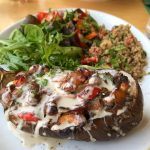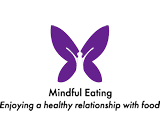Improve Your Relationship With Food For Better Eating Habits
 Eating is such a routine behaviour that it can be done with little or no thought. The brain is very good at operating on ‘autopilot’, and the great thing about habits is that when we don’t have to think too much about things it enables the brain to save energy for more challenging tasks, and it also helps us to multi-task. However, some habits are helpful and others are less helpful- we could call them ‘positive autopilots’ and ‘negative autopilots’. Positive autopilots include driving a car or cleaning our teeth, and examples of negative autopilots are mindlessly scrolling on our phones and getting little enjoyment or benefit out of it, or eating large quantities of snack foods whilst watching TV and not really noticing or savouring the taste. When it comes to habit change, awareness is key. Once we’re aware we can start creating strategies for positive change. It might simply be that instead of keeping a large packet of snack food by your side whilst watching TV, you put some of the snack food into a bowl and remove the packet to the kitchen cupboard. When exploring our current habits, we have to also consider underlying motivations, drives and needs to understand why a behaviour might have become a compulsive habit. This includes exploring our overall relationship with food.
Eating is such a routine behaviour that it can be done with little or no thought. The brain is very good at operating on ‘autopilot’, and the great thing about habits is that when we don’t have to think too much about things it enables the brain to save energy for more challenging tasks, and it also helps us to multi-task. However, some habits are helpful and others are less helpful- we could call them ‘positive autopilots’ and ‘negative autopilots’. Positive autopilots include driving a car or cleaning our teeth, and examples of negative autopilots are mindlessly scrolling on our phones and getting little enjoyment or benefit out of it, or eating large quantities of snack foods whilst watching TV and not really noticing or savouring the taste. When it comes to habit change, awareness is key. Once we’re aware we can start creating strategies for positive change. It might simply be that instead of keeping a large packet of snack food by your side whilst watching TV, you put some of the snack food into a bowl and remove the packet to the kitchen cupboard. When exploring our current habits, we have to also consider underlying motivations, drives and needs to understand why a behaviour might have become a compulsive habit. This includes exploring our overall relationship with food.
Mindful Eating Versus Mindless Eating
Mindless eating is where we consume food without awareness and with little thought. It can result in overeating, and it may not even be that enjoyable if we’re not savouring the taste. If we eat mindlessly on a regular basis this can lead to weight gain and health problems. In contrast, mindful eating is about being present with the food in front of you, enjoying and appreciating food, whilst eating in accordance with your body’s needs. Eating mindfully involves thinking before you eat, checking in with yourself to decide whether to eat, what to eat and how much to eat, and when to stop eating. Mindful eating is also about flexibility and balance, and giving yourself permission to eat foods you enjoy as part of a balanced diet rather than trying to avoid ‘bad’ foods and then craving them because you won’t allow yourself to eat them. Read my blog post: ‘What Is Mindful Eating?’.
Engaging The Brain And Becoming More Self-Aware
Mindful eating is about paying more attention to the eating process itself, being present with food and engaging the brain before and during eating to help you make better food decisions and have positive eating experiences. In order to become a more mindful eater, building self-awareness is key, enabling you to then deconstruct old habits and replace them with new, more helpful ones. Mindfulness itself is about non-judgemental observation (of self or of someone/something else), gaining insight, gathering information and implementing new habits that are in your own best interest (self-care). Mindful eating isn’t about striving for perfect eating, but a realistic, sustainable, ‘middle-way’ approach to food. This is completely different to following restrictive food rules, and instead about becoming a more intuitive eater, respecting your body and noticing its signals, and setting up a more personalised way of eating that takes into account your own particular preferences, needs, skills and lifestyle.
‘Non-Hunger’ Eating
Food and feelings can become tightly intertwined- how and what a person eats can reflect what’s going on for them emotionally, and so becoming aware of non-hunger eating and how often they’re doing it is a key part of understanding a person’s relationship with food. You can read my blog post: ‘The Difference Between Hunger And Cravings’. Unfortunately, many people go on diets to lose weight but go back to their old eating habits post weight loss- as the diet plan has only offered them a weight loss solution and hasn’t helped them to address their relationship with food, most people re-gain the weight- this is why so many people get trapped in a vicious cycle of yo-yo dieting. Many times I’ve heard clients say to me “I’ve done all the diets!”. Improving your relationship with food includes exploring any unhelpful thoughts, beliefs and attitudes around food and dieting (and in relation to yourself), looking at the different types of eating you might be regularly doing (such as ‘reward’ eating, stress eating, eating to feel calmer, or eating in order to justify taking a break), ingrained beliefs and habits such as believing you must always clear your plate, and all-or-nothing thinking/behaviours such as starving before a holiday and binge eating during the holiday.
Read more about my webinar: ‘How To Stop Binge Eating For Good’.
10 Mindless Eating Behaviours
1. ‘Hoovering up’ any food in front of you (if it’s there you eat it, whatever it is and whether or not you’re feeling full)
2. Not planning your meals and snacks- just grabbing the same old foods with little thought
3. Clearing your plate despite feeling stuffed before you’ve finished
4. Eating foods from large packets without thinking about how much of the packet you’re eating
5. Overdoing it on the food just because you’re at a social event and you’re faced with lots of choice
6. Eating foods that don’t satisfy your appetite- they taste good, but cause you to feel hungry soon afterwards, leading to more eating
7. Eating with lots of distractions and very quickly, so you barely notice what and how much you’ve eaten
8. Automatically going for a second helping at dinner time or two courses in a restaurant, not just one or two
9. Making a beeline for food as soon as you feel stressed, upset, bored or lonely
10. Not comparing food labels to make a more helpful choice, just going for what looks nice or is the cheapest.
Any of these sound familiar? What might you need to focus on?
Learning To Genuinely Enjoy Food
 It’s easy to eat on autopilot particularly when you’re distracted by something else (such as TV eating, chatting at a dinner party or eating lunch whilst working). If your mind is focused on other things it’s very easy not to notice what, or how much, you’re eating. Some people ‘graze’ throughout the day and pop things into their mouth without barely noticing. The manner in which you eat can really influence your enjoyment of food, and where people feel a lot of guilt and shame around their eating, there is often little enjoyment. If you slow down and savour your food, you’re more likely to enjoy it and feel satisfied, which in turn can help to address overeating.
It’s easy to eat on autopilot particularly when you’re distracted by something else (such as TV eating, chatting at a dinner party or eating lunch whilst working). If your mind is focused on other things it’s very easy not to notice what, or how much, you’re eating. Some people ‘graze’ throughout the day and pop things into their mouth without barely noticing. The manner in which you eat can really influence your enjoyment of food, and where people feel a lot of guilt and shame around their eating, there is often little enjoyment. If you slow down and savour your food, you’re more likely to enjoy it and feel satisfied, which in turn can help to address overeating.
So mindful eating is about slowing down the whole eating process and paying attention to what’s going on. Perhaps you’re eating a main meal but you’re too focused on the dessert to follow, so not really noticing the main meal. Perhaps you eat when you’re not hungry and have a tendency to eat ‘with your eyes’ so that you end up eating any food that happens to look good, or you have a compulsion to eat food simply because it’s in front of you and in reach. We have to take charge of the food environment and not be overly influenced by it by being aware of the power of external cues such as the sight, smell and proximity of food, as well as food marketing.
Addressing Excuses To Eat & Eating Triggers
Learning to eat mindfully includes becoming aware of underlying motivations to eat and any excuses a person might frequently use to justify eating, such as ‘I can’t let it go to waste’, ‘You have to completely indulge when you go out for a meal’, ‘Now the packet’s open I might as well eat the lot’, ‘Food is my crutch when I’m stressed’, ‘I blew it at lunch so I might as well write off the rest of the day’ or ‘I’m not going to miss out if everyone else is having dessert’. I help individuals to identify their triggers to eat- many people describe themselves as emotional eaters, perhaps ‘soothing’ themselves with food when they’re bored, stressed, angry, frustrated, anxious, feeling unfulfilled, tired after a hard day at work or lonely. I help them to become more aware of their own thoughts, beliefs, feelings, attitudes and behaviours in relation to food, enabling them to identify and address their underlying motivations for eating, as well as what food might symbolise for them. You can read more about emotional eating.
Planning
 Planning your food in advance is an important aspect of mindful eating, as it can help you to be prepared in advance and provide you with some clarity and structure for making healthier food choices rather than more spontaneous, less healthy food choices you may regret or not particularly enjoy, such as when you’re very hungry in a restaurant and making a quick choice from the menu. Thinking about what you’re going to eat beforehand can help you to prepare for temptations as they arise- if you know in advance roughly what you plan to eat and plan to avoid, you’ll be in a stronger position to make better food choices. Setting intentions in advance can be really helpful.
Planning your food in advance is an important aspect of mindful eating, as it can help you to be prepared in advance and provide you with some clarity and structure for making healthier food choices rather than more spontaneous, less healthy food choices you may regret or not particularly enjoy, such as when you’re very hungry in a restaurant and making a quick choice from the menu. Thinking about what you’re going to eat beforehand can help you to prepare for temptations as they arise- if you know in advance roughly what you plan to eat and plan to avoid, you’ll be in a stronger position to make better food choices. Setting intentions in advance can be really helpful.
Awareness Is Power
Get curious about your eating. If you’re aware of how and why you eat, you’ll have a much better chance of making positive, sustainable changes. As well as building self-awareness, your foundation stone has to be self-compassion, especially if you have a strong inner critic. Self-compassion is easier to adopt when you have better understanding of yourself- feeling guilty or beating yourself up only holds you back, so embrace your new journey with compassionate curiosity and hope.
My Services
One-to-Ones: SPECIAL OFFER: buy three sessions up front and get a 4th session HALF PRICE (£30). Contact me via email.
Webinar: ‘How To Stop Binge Eating For Good’.
Fortnightly support group (online): please click here for more information.
Purchase tickets for any of my events via Eventbrite.
Follow me on Instagram. For additional information and tips see my blogs.

